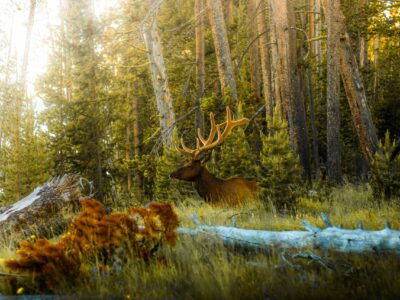My first relationship to God’s creation was a posture of dominance.
The earth was made for me to master. Everything I see is mine for the taking. As a child of God, it is my birthright, my kingdom, my domain. Increase and multiply within it.
This is the posture of power, of greed, of entitlement, and it turns out it’s exactly the opposite of what God commanded.
When I read “subdue and master,” God said, “keep and tend.”
Am I supposed to be a landlord of creation or a mindful gardener alongside the Father?
Love Is the Greatest Commandment
“Teacher, what is the greatest commandment in the Law?”
He replied, “You must love the Lord your God with all your heart, with all your being, and with all your mind. This is the first and greatest commandment. And the second is like it: You must love your neighbor as you love yourself. All the Law and the Prophets depend on these two commands.”Matthew 22:36-40 CEB
Love is the universal abiding force that undergirds all of humanity. Humanity’s one requirement is to love God (maker of heaven and earth) and to love our neighbor and to love ourselves. That’s it, Jesus says. That’s all.
If love is the greatest commandment, the sandwich meat in the middle of God and self is the neighbor. Who, exactly, is our neighbor?
A legal expert asked Jesus the same question.
In Luke 10:25-37, Jesus tells the familiar Parable of the Good Samaritan. The neighbor in this story is an anonymous man, with no identifiable qualifications except that he existed, that he was beaten and stripped down to nothing, and that he was left, nearly dead, on the side of a road.
Who is our neighbor? This guy. He’s also some guy that’s hungry, some girl that needs clothing, somebody who is thirsty, some refugee in need of a safe place, someone sick in need of healing, someone in trouble with the law who needs a friend (Matthew 25:31-46 CEB).
Our neighbor is everyone, everywhere. And our neighbor has real, felt needs that we’re called to try to meet.
God’s Love for the Whole World
One of the most familiar passages of Scripture, John 3:16, reminds us of the extent of God’s love. “God so loved the world…” it begins, and in that phrase God holds the whole world in his hands. (Sing with me!)
“The world” in John 3:16 comes from the Greek kosmos. It sometimes refers to the human family, sometimes the earth, sometimes the world’s order, sometimes people who are alienated from God, and sometimes the whole universe.
God doesn’t just love everyone, everywhere. He also loves everything, everywhere.
God Cared about Creation… Even Before There Were People
Before the crowning jewel of his creation, God made everything else, and he called it all good.
It’s all good, every poplar and penguin, every fungus and flounder, every molecule and microorganism, all made by God and created for God’s good pleasure and delight. For eons, the world/universe has existed for the purpose of simply being, long before humans came to “make use of it.”
Creation is good in and of itself, without purpose or production. It is good because it is made by God.
And a Good Creator cares about his creation.
God Is in the Details of Creation
The Bible provides loads of examples of how God cares about the details of his creation. At the end of the book of Job—one of the oldest books in the Bible—God goes into explicit detail about how much he tends to and cares for creatures far beyond the reach of humans.
He has given them vast and uninhabited mountain ranges, arid deserts, deep oceans. He has given them homes in the crook of tree limbs, abundant food and instincts to find it, migratory pathways they travel with the purpose of procreating, of joining into this process of creation with him.
Jesus tells his followers to consider even the lilies of the field that grow of their own accord. They are more beautiful than anything humans can make. God makes sure they have what they need… so how much more will he make sure you have what you need?
God is in the details of creation, making sure that plants, animals, and humans alike are taken care of so they can flourish.
He cares about creation as if it is a hungry, thirsty, naked stranger.
So maybe nature is our neighbor.
Now Go and Do Likewise
At the end of the Parable of the Good Samaritan, Jesus tells the legal expert that challenged him regarding the Law to show mercy on his neighbor, to “go and do likewise” (Luke 10:37 CEB).
We are the bearers of God’s likeness on earth, the body of Christ, “God’s accomplishment, created in Christ Jesus to do good things,” writes Paul in Ephesians 2:10 (CEB). “God planned for these good things to be the way that we live our lives,” he continues.
As the hands and feet of Jesus, there’s a whole world of hungry and thirsty humans whose lives and livelihoods have been threatened by rising tides and violent storms, by drought and floods, by extreme heat and melting glaciers. And there is an even bigger population of God’s favored creation that cannot tolerate or adapt to such drastic climate changes.
The good world God created is at risk of ruin by the very hands of the ones God created in his image.
And yet.
God is a God of restoration, of new hope, of healing. God is a God that has empowered his people to live holy and complete lives, pouring their love into their neighbors. God is a God that entrusted creation with his image bearers and called them to love it the way he loves it. We can be partners in God’s work of restoration. We can be a part of the new thing God is doing, the ways he is making in the wilderness, the streams he is planting in the desert.
Let’s go and do likewise.





 Copyright
2024
Root and Vine
Copyright
2024
Root and Vine